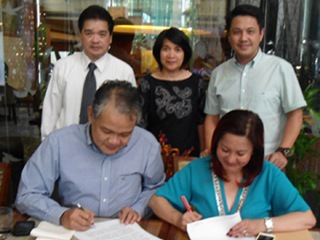
The Philippine International Seafreight Forwarders Association (PISFA) recently signed with the Association of International Shipping Lines (AISL) a memorandum of agreement designed to rationalize procedures in posting container deposits.
So far, only two of the 41 AISL-member lines—APL and “K” Line—will participate in the scheme, effective for two years from April 16, 2013 to April 16, 2015.
Provisions of the MOA were explained by both sides at Wednesday’s general membership meeting of PISFA. The MOA itself was signed earlier by PISFA president Irene Tan and AISL president Edgar Milla.
Under the agreement, a PISFA member company will be allowed to deposit company checks for container deposits with AISL participating carriers. The check will be returned to the PISFA member within three to seven days of turnover of the container.
The cost of repairs for damaged containers and detention charges will be deducted from the container deposit; if the deposit is insufficient to pay for the costs, the forwarder will be asked to pay up.
“The cost of repair or detention charges on a container is determined by the shipping lines,” AISL general manager Atty. Maximino Cruz, who was invited to address the gathering, said.
Participation by PISFA members in the scheme is not automatic: Each has to go through a separate accreditation to be conducted by PISFA to determine their suitability for the program.
The MOA also provides that prior to the implementation of the agreement, PISFA will deposit a P1-million cash bond to secure payment of the obligation if the check deposited by its accredited member is not honored by a bank.
“We are happy with it,” said Tan, when asked how forwarders reacted to the signing of the memorandum. “Now everything is clear to us, unlike previously when we had to wait too long for our deposits to be returned.”
Cruz acknowledged the “MOA is far from perfect, but it aims to end an additional source of dispute between the freight forwarders and the shipping lines.”
Cruz noted he still has to fully sell the idea to the liners. “The problem is the shipowners are overseas and their representative offices here in Manila cannot decide for the owners.”
Carriers had earlier been criticized for delays in returning cash deposits on containers consigned to them. Cruz explained this was so because the process had to go through channels.
The uneven amounts of deposit levied by shipping firms were also a bone of contention. Cruz said the Competition Law is strict about setting uniform rates. “The shipping lines can’t set the same deposit amounts, or they would be accused of connivance,” he said.
Shipping companies previously required forwarders to deposit cash ranging from P5,000 to P7,000 per TEU and P10,000 to as high as P15,000 per FEU, as a guarantee for the return of containers in good condition. The deposits are used to pay for loss or repair of damaged containers.




